Cyclone Pam destroyed Vanuatu
The United Nations confirmed 11 deaths, lowering an earlier figure of 24. Local people and aid agencies say that the rebuilding effort will be immense.
The Telegraph, The Guardian, BBC · VANUATU · 17 MARCH 2015 · 15:45 CET
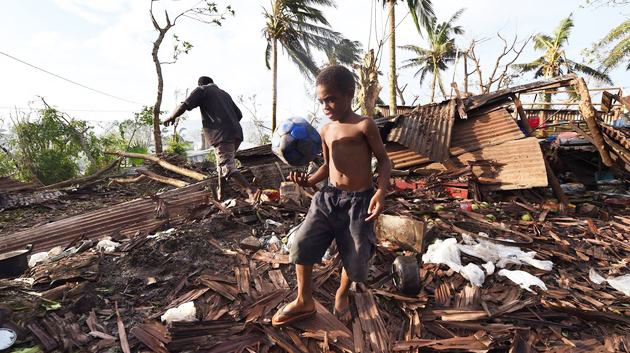
The category five storm hit Vanuatu on Saturday, bringing wind gusts of up to 300km/h (185mph). Across the Pacific nation, many people have lost their homes or face extensive rebuilding.
Radio and telephone communications with the outer islands were just beginning to be restored, but remained incredibly patchy three days after Cyclone Pam hit.
The President, returning from a conference in Japan, described the storm as a "monster" that wiped out years of development. He linked the disaster to climate change, citing changing weather patterns, rising seas and heavier-than-average rain in Vanuatu.
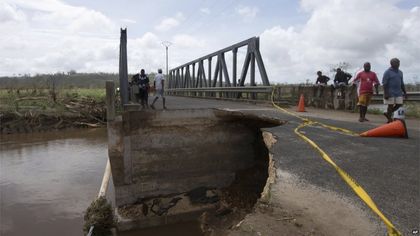
ELEVEN DIE, THOUSANDS ARE DISPLACED
The UN Office for the Coordination of Humanitarian Affairs (OCHA) reported that 11 people were confirmed dead, including five on Tanna, lowering their earlier report of 24 casualties after realising some of the victims had been counted more than once. Among the casualties was a one-week-old baby.
On the main island and in the provinces of Torba and Penama to the north, around 3,300 people were in evacuation shelters, OCHA said.
Outlying areas of Vanuatu hit by Cyclone Pam suffered "significantly worse" damage than the island nation's capital, aid workers have reported.
Teams carrying medical supplies, food, water and shelter equipment landed on the outer islands of Tanna and Erromango, agencies said. Getting aid to the islands has proved difficult because of a lack of landing strips or deepwater ports.
Tom Perry from Care Australia said relief workers in Tanna reported the hospital was functioning but had no roof. "The impression they got from their initial observations was that the damage is significantly worse than in Port Vila," Mr Perry told AFP news agency.
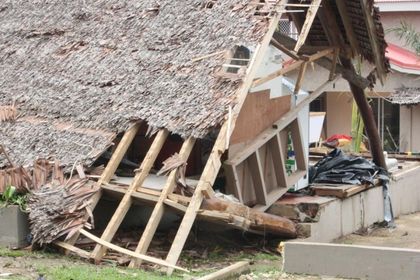
AID NEEDED
Jacqueline de Gaillarde, the Red Cross Vanuatu chief executive, said: "We need food for the coming weeks and we need humanitarian people to do assessments and we need transport. We need boats to access the islands, because lots of the airports on the islands are grass only and they are flooded so we cannot land."
"We urgently need water purification tablets to make sure that the water is safe to drink, and food for communities whose crops have been absolutely destroyed and will take up to three months to grow. We absolutely need shelter", Alice Clements of UNICEF told the BBC.
Teams of aid workers and government officials carrying medical and sanitation supplies, water, food and shelter equipment managed to land on Tanna and neighbouring Erromango Island on Tuesday afternoon, said Colin Collett van Rooyen, Vanuatu director for aid group Oxfam. The two islands were directly in the path of the storm.
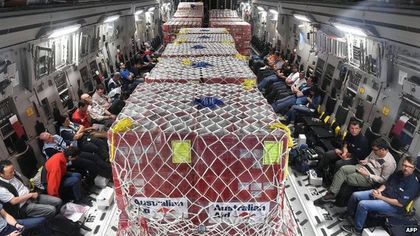
The foreign affairs minister, Julie Bishop, said Australia offered extra assistance in response to reports from its aerial surveillance teams, which have been flying over Vanuatu’s southern islands. She refused to comment on casualties, saying the numbers were still too “fluid”, but added: “We anticipate that that number will increase as we are able to access a number of islands, particularly in the south and in provinces where communications are down.
Britain and France, which jointly administered Vanuatu when it was known as the New Hebrides before independence in 1960, joined Australia and New Zealand in promising millions of pounds' worth of aid.
REBUILDING THEIR LIVES
For the population of Port Vila, the emphasis is on the recovery and remembering those who died.
“There are more than 100,000 people likely to be homeless, more than 90 per cent of houses damaged in Port Vila alone, nearly every school destroyed, full evacuation centres, damage to health facilities and the morgue,” Mr Collet van Rooyen, said.
In a church in the capital’s northern suburbs, pastor Willy Yannick saw a baby he knew to be just a week old die on the night of the cyclone. “Her mother did not get to cover her up in a thick warm blanket. When they came here she was still alive. That night the storm cost her life”, the pastor told the Guardian.
Yannick said more than 50 families continued to live at Pakaroa Presbyterian Church, with the reconstruction of their homes at least three months away. “All the houses have been blown away in this area,” he said.
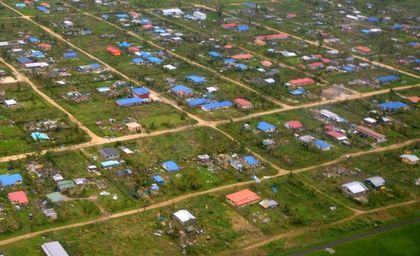
No food has arrived from outside sources, save some tea and biscuits from the national disaster management office. While aid workers express relief at the comparative lack of death and destruction in some areas, they also fear these are the communities who may be forgotten – just as they’re running out of food.
Published in: Evangelical Focus - world - Cyclone Pam destroyed Vanuatu
